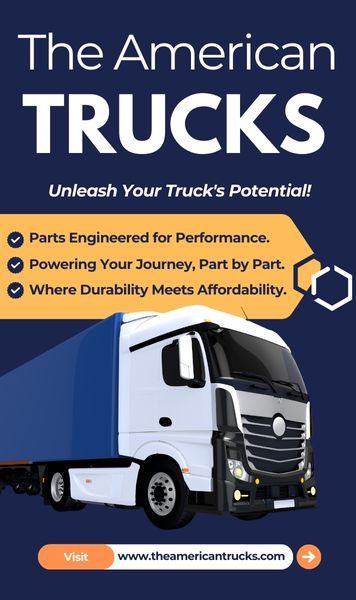
How Height Leveling Control Valves Enhance Safety in American Trucks
In the heavy-duty trucking world, safety is paramount, and height leveling control valves play an essential role in ensuring stable handling, efficient braking, and a balanced load for American trucks. At TORQUE PARTS, we understand that components like height leveling control valves are not only about ride comfort—they are pivotal to safety on the road. In this article, we’ll delve into the crucial role of these valves within air brake systems, exploring how they contribute to safer driving experiences.
Understanding Height Leveling Control Valves
Height leveling control valves are part of the air suspension system, which works in conjunction with air brake systems to maintain stability. These valves manage the truck’s ride height by regulating the air in the suspension bags. When loaded, a truck’s suspension experiences changes in weight and height. Height leveling control valves respond to these changes, ensuring the vehicle maintains a consistent ride height. This balance is essential for maintaining control, especially on uneven terrain or during sudden maneuvers.
Enhancing Stability and Balance
- Weight Distribution and Control
Proper weight distribution is vital for truck safety. When a truck’s suspension height is balanced, the load is evenly spread across the axles, helping to maintain traction on all tires. This balance prevents excessive weight on individual tires, reducing the chances of blowouts and enabling better handling on curves or during emergency braking. - Improved Handling in Dynamic Conditions
Height leveling control valves automatically adjust the suspension height based on load weight. During rapid maneuvers—like sharp turns or sudden braking—these adjustments minimize swaying and provide a firm, grounded feel to the driver. With this level of control, drivers can navigate through challenging conditions more confidently, with minimized risk of rollovers. - Reducing Braking Distance
When the load is balanced, and the truck height is optimal, braking performance improves. Height leveling control valves keep the truck from “nose-diving” during hard braking, which can reduce stopping distances and help prevent accidents. By preventing the load from shifting too much, these valves also reduce wear on brakes, keeping them in better working condition over time.
Safety Implications of Properly Functioning Height Leveling Control Valves
- Reduced Risk of Rollovers
Rollovers are one of the most dangerous accidents in trucking, and they often occur due to a shift in the truck’s center of gravity. Height leveling control valves mitigate this risk by keeping the load stable and maintaining the correct center of gravity. With consistent ride height, trucks can maneuver safely at higher speeds and around curves, greatly reducing the risk of tipping. - Enhanced Trailer Stability in High Winds
For trailers, especially those with high profiles, wind resistance can disrupt handling, especially on open roads. A well-calibrated height leveling control valve keeps the trailer steady in high-wind conditions. When the trailer height remains constant, wind impact has less of an effect, allowing the truck and trailer to maintain straight-line stability. This is critical in preventing trailer sway and jackknifing incidents. - Avoidance of Suspension Damage
Overloaded suspensions, caused by faulty height leveling control valves, can lead to severe damage. An over-compressed or under-inflated suspension might not absorb shocks effectively, which increases stress on other components and leads to faster wear. Well-maintained height leveling control valves prevent this damage, extending the life of the truck’s suspension system and contributing to safer journeys by minimizing the risk of sudden suspension failures on the road.
Regular Maintenance: A Key to Safety
- Identifying and Addressing Valve Malfunctions
Height leveling control valves are subject to wear, especially in demanding conditions. Drivers and fleet managers should conduct regular checks for air leaks, incorrect height settings, or damaged components. A malfunctioning valve can result in improper ride height, jeopardizing safety. Frequent inspections, coupled with preventative maintenance, ensure valves are responsive and functional. - Replacing Worn or Damaged Valves
Even minor valve malfunctions can affect the entire suspension system. Replacing damaged height leveling control valves prevents cascading issues, such as increased brake wear or uneven tire wear, both of which impact safety. At TORQUE PARTS, we advocate using high-quality replacement parts designed to meet or exceed OEM standards, ensuring reliability in all driving conditions. - Adjusting for Load Changes
Drivers should ensure that height leveling valves are adjusted when the load varies. Whether carrying a full load or traveling empty, height leveling controls must accommodate changing weights for optimal performance. Many trucks come with manual or automatic height leveling adjustments, but a thorough check guarantees stability.
Benefits of Investing in Quality Height Leveling Control Valves
- Consistency and Durability
High-quality height leveling control valves provide consistent performance, withstanding the pressures of heavy loads, rough terrain, and frequent use. They ensure that the truck’s height stays consistent regardless of load weight, enhancing stability and safety. TORQUE PARTS offers valves built to handle these demands, reducing the need for frequent replacements and maintenance. - Cost-Effective Safety
While height leveling control valves are small components, they are integral to a truck’s safety and operational efficiency. By investing in reliable, high-quality valves, fleet operators can save on repair costs associated with suspension, brake, and tire wear. In the long run, the safety benefits far outweigh the initial investment, helping fleet owners maintain a safer, more efficient fleet. - Enhanced Driver Comfort and Control
Safety goes hand-in-hand with driver comfort. When the truck maintains a stable ride height, drivers experience less vibration and fewer sudden jolts, reducing fatigue. Comfortable drivers are more alert, which directly impacts their reaction time and decision-making, further promoting safety on the road.
Common Issues with Height Leveling Control Valves
- Air Leaks and Seal Failures
Height leveling control valves operate using compressed air. Over time, seals within the valve may degrade, leading to air leaks that compromise function. Drivers might notice an irregular height or feel an unbalanced load if a leak occurs. Regular inspections for air leaks can help catch this problem early, preventing unexpected breakdowns. - Valve Clogging
Dust, debris, and moisture can accumulate in the valve, obstructing airflow and affecting height control. In such cases, the truck might sit lower or higher than desired, impairing handling and stability. Cleaning and replacing valves periodically can prevent clogging issues, ensuring reliable performance. - Mechanical Wear and Tear
Height leveling control valves endure significant mechanical stress, leading to wear and tear over time. While high-quality valves are designed to withstand these conditions, eventual degradation is inevitable. Drivers should report any signs of irregular suspension behavior, and faulty valves should be replaced promptly to maintain safety.
Conclusion: Ensuring Safety through Proper Maintenance
Height leveling control valves are small but vital components that significantly enhance safety for American trucks. By maintaining consistent ride height, these valves play an essential role in load balance, braking performance, and overall stability. For fleet operators and drivers, regular inspections and timely replacements are essential steps to avoid malfunctions that could jeopardize safety.
At TORQUE PARTS, we are dedicated to providing top-tier parts that help trucking professionals maintain the highest standards of safety and reliability on the road. With the right components and a commitment to regular maintenance, height leveling control valves can continue to support safe, efficient, and comfortable journeys for years to come.
Follow us to get detailed information: Height Leveling Control Valves
Check out our Air Brake Components




